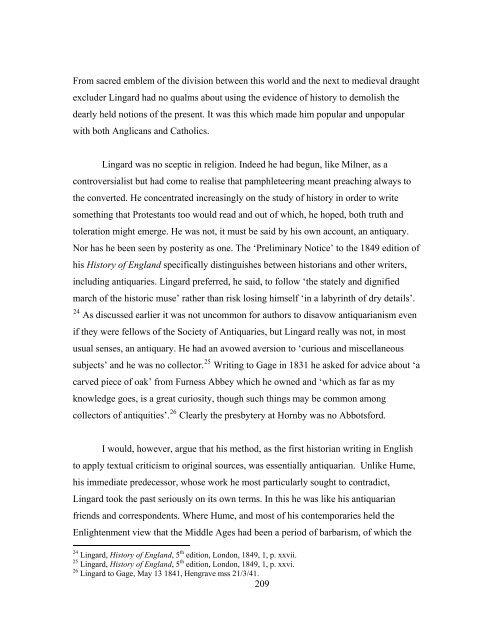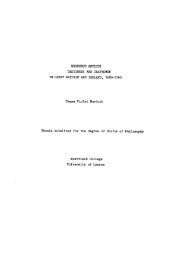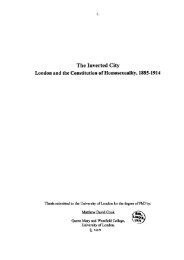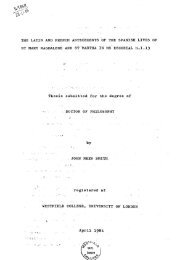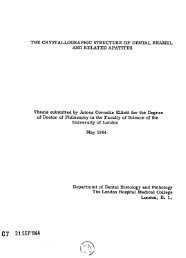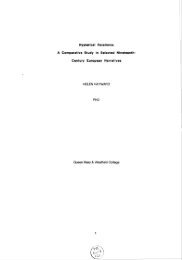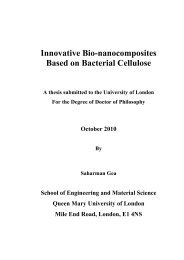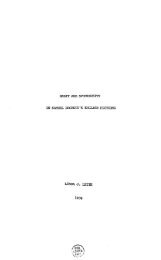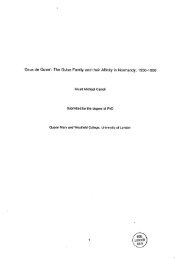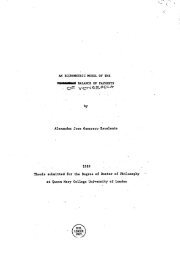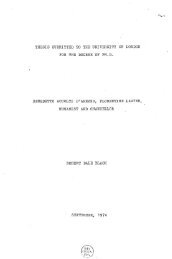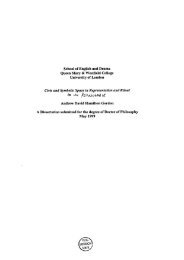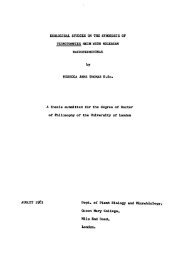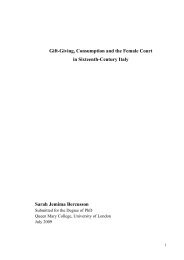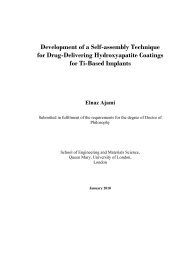Antiquaries in the Age of Romanticism: 1789-1851 - Queen Mary ...
Antiquaries in the Age of Romanticism: 1789-1851 - Queen Mary ...
Antiquaries in the Age of Romanticism: 1789-1851 - Queen Mary ...
Create successful ePaper yourself
Turn your PDF publications into a flip-book with our unique Google optimized e-Paper software.
From sacred emblem <strong>of</strong> <strong>the</strong> division between this world and <strong>the</strong> next to medieval draught<br />
excluder L<strong>in</strong>gard had no qualms about us<strong>in</strong>g <strong>the</strong> evidence <strong>of</strong> history to demolish <strong>the</strong><br />
dearly held notions <strong>of</strong> <strong>the</strong> present. It was this which made him popular and unpopular<br />
with both Anglicans and Catholics.<br />
L<strong>in</strong>gard was no sceptic <strong>in</strong> religion. Indeed he had begun, like Milner, as a<br />
controversialist but had come to realise that pamphleteer<strong>in</strong>g meant preach<strong>in</strong>g always to<br />
<strong>the</strong> converted. He concentrated <strong>in</strong>creas<strong>in</strong>gly on <strong>the</strong> study <strong>of</strong> history <strong>in</strong> order to write<br />
someth<strong>in</strong>g that Protestants too would read and out <strong>of</strong> which, he hoped, both truth and<br />
toleration might emerge. He was not, it must be said by his own account, an antiquary.<br />
Nor has he been seen by posterity as one. The ‘Prelim<strong>in</strong>ary Notice’ to <strong>the</strong> 1849 edition <strong>of</strong><br />
his History <strong>of</strong> England specifically dist<strong>in</strong>guishes between historians and o<strong>the</strong>r writers,<br />
<strong>in</strong>clud<strong>in</strong>g antiquaries. L<strong>in</strong>gard preferred, he said, to follow ‘<strong>the</strong> stately and dignified<br />
march <strong>of</strong> <strong>the</strong> historic muse’ ra<strong>the</strong>r than risk los<strong>in</strong>g himself ‘<strong>in</strong> a labyr<strong>in</strong>th <strong>of</strong> dry details’.<br />
24<br />
As discussed earlier it was not uncommon for authors to disavow antiquarianism even<br />
if <strong>the</strong>y were fellows <strong>of</strong> <strong>the</strong> Society <strong>of</strong> <strong>Antiquaries</strong>, but L<strong>in</strong>gard really was not, <strong>in</strong> most<br />
usual senses, an antiquary. He had an avowed aversion to ‘curious and miscellaneous<br />
subjects’ and he was no collector. 25 Writ<strong>in</strong>g to Gage <strong>in</strong> 1831 he asked for advice about ‘a<br />
carved piece <strong>of</strong> oak’ from Furness Abbey which he owned and ‘which as far as my<br />
knowledge goes, is a great curiosity, though such th<strong>in</strong>gs may be common among<br />
collectors <strong>of</strong> antiquities’. 26 Clearly <strong>the</strong> presbytery at Hornby was no Abbotsford.<br />
I would, however, argue that his method, as <strong>the</strong> first historian writ<strong>in</strong>g <strong>in</strong> English<br />
to apply textual criticism to orig<strong>in</strong>al sources, was essentially antiquarian. Unlike Hume,<br />
his immediate predecessor, whose work he most particularly sought to contradict,<br />
L<strong>in</strong>gard took <strong>the</strong> past seriously on its own terms. In this he was like his antiquarian<br />
friends and correspondents. Where Hume, and most <strong>of</strong> his contemporaries held <strong>the</strong><br />
Enlightenment view that <strong>the</strong> Middle <strong>Age</strong>s had been a period <strong>of</strong> barbarism, <strong>of</strong> which <strong>the</strong><br />
24 th<br />
L<strong>in</strong>gard, History <strong>of</strong> England, 5 edition, London, 1849, 1, p. xxvii.<br />
25 th<br />
L<strong>in</strong>gard, History <strong>of</strong> England, 5 edition, London, 1849, 1, p. xxvi.<br />
26<br />
L<strong>in</strong>gard to Gage, May 13 1841, Hengrave mss 21/3/41.<br />
209


